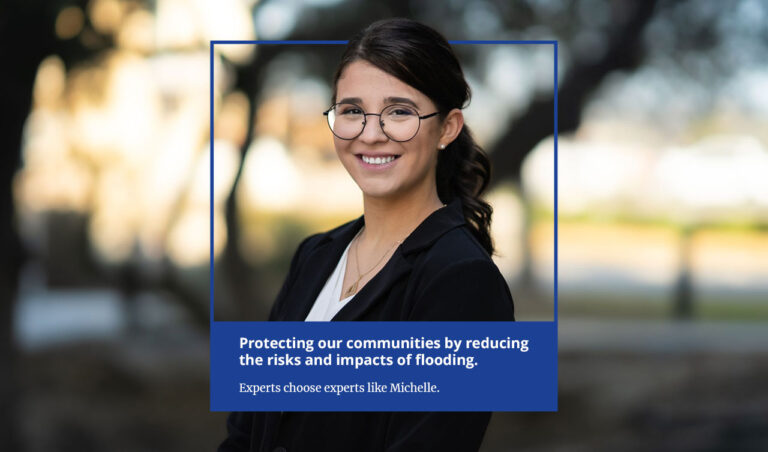Becoming a Certified Floodplain Manager: A Flood of Opportunity

Floodplain management is like solving a big puzzle where the end goal is to keep people and their homes safe during a flood event. But figuring out this puzzle requires specialized knowledge, skills, and experience. We sat down with Certified Floodplain Manager (CFM) Michelle Barkley to discuss how one gains this experience and the importance of the certification.
But first, what exactly is floodplain management? Floodplain management refers to the practices, policies, and strategies employed to mitigate and reduce the risks associated with flooding in floodplain areas. The primary goals of floodplain management are to protect lives and property, minimize flood damage, and promote the sustainable use of floodplain areas.
What prompted you to become a CFM?
When you work within the hydrology and hydraulics department, the majority of your work revolves around floodplain analysis. (Like preparing FEMA CLOMR, LOMRs, and LOMR-F submittals, flood studies, floodplain permit applications, and hydrologic and hydraulic impact analyses for submittal to local jurisdictions). And Certified Floodplain Managers are experts in floodplain mapping, and the requirements of the state floodplain management program.
Many of the responsibilities required of CFMs are mutually inclusive to many of my current job responsibilities, so getting this certification could only benefit me more.
What are the advantages to becoming a CFM?
Becoming a CFM increases your depth of understanding when dealing with FEMA floodplains. Not only am I an engineer responsible for doing the floodplain analysis, but I am now nationally certified to understand the regulatory requirements and procedures needed to make floodplain management work at the community level.
What did you learn from this experience?
Citizens are just as responsible for abiding by FEMA floodplain regulations as private consulting firms are.
Was there anything that surprised you on the exam?
Being an engineer, I have been conditioned to approach every exam I take analytically, with formulas at hand. But the CFM exam strictly tests you on your familiarity with National Flood Insurance Policy regulatory standards, community guidelines, flood insurance policies, and tests your comprehensive ability to comply with floodplain regulations based on hypothetical scenarios you may be faced with within your community. So coming from an engineering background, being forced to sit down for a test without math definitely took me out of my comfort zone.
What advice would you give to somebody who wants to become a CFM?
This exam is frequently underestimated because it is not based on quantitative reasoning.
In my opinion, memorizing the ENTIRE regulatory processes and guidelines for a community, and being tested on your ability to comply with it is a lot more demanding than doing calculus. But maybe that’s just because I enjoy math…
How does this impact your daily tasks?
Receiving this certification has increased my scope of knowledge with all aspects of regulatory floodplain guidelines and I can immediately see the confidence in my performance increasing. Overall, I know more, and I work faster.
What is your favorite thing about being an engineer, in general?
By employing my expertise, I have the opportunity to make a tangible difference in the lives of individuals and communities affected by devastating floods. I have the opportunity to witness firsthand the positive impact of my efforts after successfully designing and implementing effective stormwater management systems. Knowing that my work contributes to enhancing public safety, protecting property, and safeguarding the environment systems fills me with a profound sense of fulfillment and purpose. The ability to utilize scientific knowledge, advanced technologies, and sustainable practices in order to mitigate the devastating consequences of flooding empowers me to be a catalyst for positive change. The gratitude expressed by those who benefit from our work serves as a constant reminder of the importance and meaningfulness of my role in building resilient communities. In the face of a global climate crisis and increasing flood risks, being an engineer focused on reducing flooding impacts allows me to contribute to a more sustainable and secure future, which is truly my favorite part of this job.
When in your career did you realize this would be an advantage?
When all of the regulatory entities we submit our analysis to were all Certified Floodplain Managers. I realized that the entities regulating us found this certification helpful, therefore I should definitely have it. Having this certification will help me overview the work we submit with their objectives in mind.
Do you feel like with this title you have new responsibilities?
Yes. Since receiving my certification, I have had the opportunity to take on more projects in South Texas’ flood-prone areas. Many of these areas consist of single-family residential developments that are adjacent to Special Flood Hazard Areas. I have been able to play a more significant role in reducing the flooding risks for these future communities.
What are you looking forward to about this certification?
Using this certification to increase my personal and professional credibility when representing the company. I’m also very excited about being an active member with the Texas Floodplain Management Association.
Thanks to experts like Michelle, CFMs contribute to effective flood risk reduction, resilient communities, and enhanced public safety in flood-prone areas.

Comments are closed.